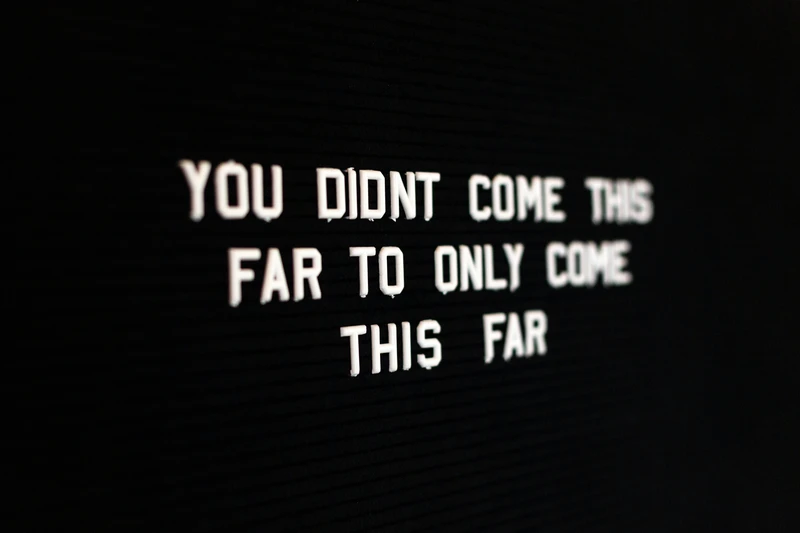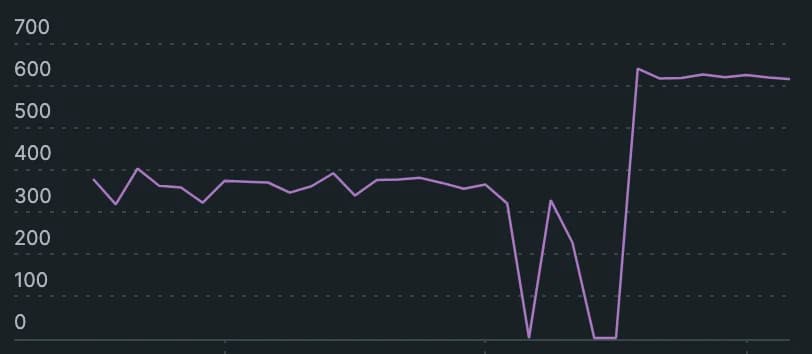4 career tips I wish I knew
By Christian Prokopp on 2022-05-25
When I mentor university students or discuss careers with the people I lead, I often draw from four pieces of advice. I wish I had known these when I started, but they come with experience, perspective and confidence. Three things most of us lack at the beginning.

Why would you care? I have worked in some form in tech for nearly 30 years now. I started by putting together computers in a small shop while still in school before focusing on the new thing, the Internet. I worked in different industries, countries, and cultures, in startups and global corporations. I worked as a labourer to pay for my studies and as a leader of other tech leaders less than ten years later. Now, I am building Bold Data, a data mining and Analytics startup. If you are interested in what I learned along the way, read on.
#1 A job is not a career
Especially university students are anxious about their first position. They are trying to land the perfect company, industry and role on the first go believing it has a deciding impact on their career. If you find the right spot on the first try, you would be an outlier, especially in tech. Think of it more as a learning opportunity.

The tech industry moves fast, and you grow as a person. The technology and roles you start your career with may not be around a few decades later. Look at how fast Hadoop came and left the scene as a must-have skill. Data Science, Data Engineering, Machine Learning, and Data Analytics are other fields that evolve rapidly with automation, tools and better processes.
But most importantly, you and your life change. One day you may love working late in a tiny startup for close to nothing to learn the latest tech, and the next day you wake up with a family, a mortgage, and worry about your pension, not your next night out. You may develop from a technophile to a leader or from an introvert to a presenter. It happens.
So do not kill yourself with the choice of the first role. Pick something you assume you can live with; more on that below. If it is a great fit, ride the wave, learn, grow, and enjoy it until you outgrow the opportunities at the place. If it is a bad fit, figure out why and if it is worth sticking for a little while to learn or build up your CV. If it makes you unhappy, move on. But in either case, good or bad, learn why! What did (not) work from people, culture, company size, industry, role, and responsibilities? Reflect on everything regularly.
#2 Know yourself as well as your opportunities
That brings us to knowing yourself. Everything you do is learning, especially when things go wrong. It is painful, but you will learn a lot if you are willing to reflect on it honestly. Are you driven by money, status, freedom, creativity, technology, self-empowerment or something else? Do you love the uncertainty, risk, and opportunity small startups give you or large organisations' reliability, structure, and hierarchy? What kind of people and culture do you thrive in, and what makes you dread going to work in the morning?

Reflect on these regularly with a friend, a mentor, your manager or yourself. Whatever is comfortable, and whoever supports you. Note that your manager might only be a good choice if you can be open about failing and ambitions beyond your current role and organisation. The right person, a leader, will look after you, not after themselves. But do not use this to unload frustrations onto someone else constantly. That is putting you both in a downward spiral. Occasional, cathartic lamenting is ok and even needed, though. Check what you can change and achieve and ignore what you can not change. Also, keep an eye on what may have changed for you since what makes you happy evolves too.
People early in their career or who are not used to reflecting are often unsure about what they want, in which case choosing the right next step is impossible. Worse, you might pursue the wrong thing. How many blue soles are out there chasing money as a false proxy to knowing what they want and feeling burned out and empty the further they get in their career. If you get a handle on what makes you happy, you can evaluate new opportunities better or adjust your role and career in your current job to make you more fulfilled. Yet, life is full of compromises and not black and white. Few people find jobs that make them jump out of bed in the morning running to the office in anticipation. But you should not hate the sight of your desk, colleagues or Mondays either. If you do, change things.
#3 Create l̶u̶c̶k̶ opportunities
People often are in despair when they feel they have no agency. I remember a young woman who felt stuck in her first job. It was a terrible environment with long hours, only negative feedback from uncaring managers, and few opportunities to learn or grow. She was worried that she was not performing well and that she could not find something else so early in her career.

Firstly, she had to give herself a break from the pressure and gain the perspective that she was treated poorly; that's where a friend or mentor helps. Secondly, I encouraged her to look for new jobs despite her concerns. The change was rapid even though the job did not change. But she identified unreasonable expectations and distanced herself from them, and she felt agency by looking for the next role and not feeling helpless. A few months later, she had two offers in places she was eager to work at and left soon after. Most importantly, the next time she had an issue, she felt empowered to go and make a change instead of feeling at the mercy of the circumstances.
Another common problem people face is feeling stuck in their role but liking their environment otherwise. The solution is to "do the job you want, not the job you have". It assumes a positive environment where you have at least some flexibility and goodwill around you, but if you do not, why would you stay? A good leader will enable, support and help you, but the drive has to come from within the person.
For example, I had people wanting to be promoted or become a leader merely because they had been around a long time in their current role and were competent in it. That is often insufficient. The best people already do small parts of the job they want. They naturally gravitate to taking on responsibilities or pitching in where their new role would be. That demonstrates their ability and motivation in one swoop. They will consistently outperform people waiting to be given opportunities.
#4 Assess opportunities and find your pattern
People, especially early in their careers, have a survivorship bias when they scrutinise others' careers and think their destination was a given, looking at the chain of roles and positions that led up to it. For many, the final destination was not intentional and unknown for most of the journey, i.e. they did not plan to end up where they did, but that is ok.

Instead, think of a career as a vast decision tree that reveals itself only one step at a time. After a few decades, it seems like a sensible linear path when you look back. Instead, it merely shows the route taken through countless decisions, hiding the untaken paths. Knowing this, you should focus more on making good decisions than worrying about an elusive endpoint that may or may not be in your tree.
I found it helpful to create scenarios for decisions outlining worst, likely and best outcomes. For example, you consider joining a promising startup with a year's runway in a new role. I have been there a few times. The worst outcome could be that it closes down in a year. A likely outcome is that it goes through a few ups and downs and founding rounds before being acquired, and you can move through a few roles or positions thanks to the growth and flexibility. The best outcome is it turns into a unicorn, and you have a stellar career.
How does that help your decision-making? Firstly, ignore the best case; you will benefit greatly, but it is also highly improbable. Secondly, is the likely outcome desirable? If it happens, would you look back and think it was the best choice given all other options you may have? If so, good. Lastly, the worst and most important scenario. If it happens, would you look back and think it was worthwhile despite having to find a new role, maybe being paid below the market rate? It is an interesting decision support point. Some may say yes because the ride is thrilling, the learning is great, and the opportunity to break into a new role or industry may be worth it when looking for the next role. Others may say no because the opportunity cost is too high in lost earnings in a more secure place or advancing their careers in larger organisations with more well-known names.
It is surprising how we get lured into dwelling on best-case scenarios that rarely matter and are more akin to playing the lottery than the likely and worst cases, which are critical to your decision. But everyone is different. If you like a good gamble, maybe play the unicorn lottery. It comes back to knowing yourself.
Learning
I hope some of the above is helpful to you. Especially mentoring students allowed me to appreciate how much experience I took for granted after a while and how useful it can be to give people perspective and context from another point of view. It is challenging to start your career or change it. Sometimes people even get far down the track in their career before realising they drifted without a supporting decision pattern or goal. Lastly, you may disagree with everything I wrote. That's fine. I am still learning too.
Christian Prokopp, PhD, is an experienced data and AI advisor and founder who has worked with Cloud Computing, Data and AI for decades, from hands-on engineering in startups to senior executive positions in global corporations. You can contact him at christian@bolddata.biz for inquiries.
Related Posts

Introducing Tax Shrink
2024-03-14
Tax Shrink is a new online tool that helps owner-operators of Limited companies in the UK calculate and visualise the ideal salary-to-dividend rati...

How to Build Training Datasets and Fine-tune ChatGPT
2023-11-29
Large-language models (LLMs) are great generalists, but modifications are required for optimisation or specialist tasks. The easiest choice is Retr...

Bing Chat argues and lies when it gets code wrong
2023-02-11
Microsoft could follow Google's $100bn loss. I tried the new Bing Chat (ChatGPT) feature, which was great until it went disastrously wrong. It even...

Faster and Cheaper: ARM Graviton vs Intel and AMD x86 AWS EC2
2023-01-20
How Bold Data achieved an astonishing 2.3x improvement by switching from x86 to ARM.

OpenAI GPT-3: Content spam or more?
2022-12-04
OpenAI's ChatGPT has made the news recently as a next-generation conversational agent. It has a surprising breadth which made me wonder, could Open...

Hard work is not appreciated!?
2022-05-30
Your hard work is not appreciated. So why should you still do it? There is a good reason.